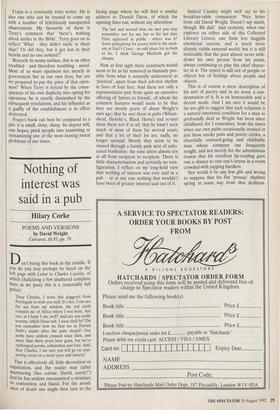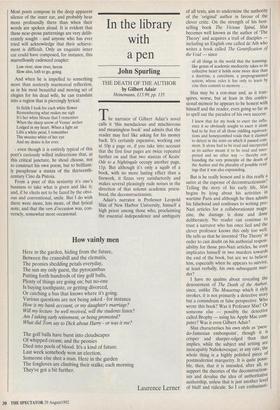Nothing of interest was said in a pub
Hilary Corke
POEMS AND VERSIONS by David Wright Carcanet, f6.95, pp. 79.
Don't being this book in the middle. If you do you may perhaps be faced on the left page with Letter to Charles Causley, of which (italicizing a few unaltered complete lines as we pass) this is a reasonably full prdcis:
`Dear Charles, I write this doggerel from Portingale to wish you well. It's hot, I can see the sea from my window, the red earth reminds me of Africa where I was born. Are you, as I hope I am, well? And are you really seventy, which Deus vult, I soon shall be? Do you remember how we first me in Patrick Swift's studio after the pubs closed? Our paths have seldom crossed since then, and more than thirty years have gone, but we've exchanged poems, admiration and love. And, dear Charles, I am sure you will go on com- posing verses in a music pure and natural.'
That is effectively all, little decoration or expatiation, and the reader may (after murmuring Deo volente, David, surely?') feel he has seldom encountered a structure so contentless and bland. For the avoid- ance of doubt one might then turn to the facing page where he will find a similar address to Donald Davie, of which the opening lines run, without any alteration:
The last and second time we met you may remember: not for me, but as the last time Eliot appeared in public - where was it? Some prizegiving for poetry held in the stadi- um at Earl's Court - an odd place for us both to be. I think George Macbeth got the cheque.
Now at first sight these constructs would seem to be as far removed as humanly pos- sible from what is normally understood as `poetical', apart from their job-trot rhythm in lines of four feet. And these are only a representative pair from quite an extensive offering of 'letters to friends', of whom the common features would seem to be that they are mostly poets of about Wright's own age; that he met them in pubs (Wheat- sheaf, Heneky's, Black Horse) and re-met them there too if at all; that he hasn't seen much of most of them for several years; and that a lot of their lot are, sadly, no longer around. Mostly they seem to be viewed through a faintly pink mist of unfo- cused bonhomie: the tone alters almost not at all from recipient to recipient. There is little characterisation and certainly no tran- figuration. I reflect on my long-held view that nothing of interest was ever said in a pub - or at any rate nothing that wouldn't have been of greater interest said out of it. Indeed Causley might well say to his breakfast-table companion: 'Nice letter from old David Wright. Doesn't say much, though. Bit dull.' And certainly, when one explores on either side of this Collected Literary Letters, one finds less sluggish emotional current, and a much more sharply visible external world; but it is still noticeable that the poet almost never with- draws his own person from his poem, always continuing to play the chief charac- ter in it. The report is still not of people or objects but of feelings about people and objects.
This is of course a mere description of his sort of poetry and in no sense a con- demnation of it. It is an honourable and a decent mode. And I am sure it would be far too glib to suggest that such solipsism is a natural emotional condition for a man as profoundly deaf as Wright has been since childhood; for I remember, from the times when our own paths occasionally crossed in just those smoky pubs and poetry circles, a cheerfully outward-going and clubbable man whose company one frequently sought, and not merely for the adventitious reason that his excellent lip-reading gave one a chance to rest one's larynx in a room crowded with yapping bardlets.
Nor would it be any less glib and wrong to suppose that his flat `prosaic' rhythms spring in some way from that deafness. Most poets compose in the deep apparent silence of the inner ear, and probably hear more profoundly there than when their words are spoken aloud. It is evident that these near-prose patternings are very delib- erately sought - and anyone who has ever tried will acknowledge that their achieve- ment is difficult. Only an exquisite inner ear could have composed, for instance, this marvellously cadenced couplet: Low river, slow river, heron Slow also, loth to go, going And when he is impelled to something more than austerely marmoreal reflection, as in his most beautiful and moving set of elegies for his dead wife, he can translate into a region that is piercingly lyrical:
In fields I look for each white flower Remembering what makes me sigh It's her white blouse that I remember When the sharp arrow of Venus' archer Lodged in my heart. When a light air Lifts a white petal, I remember The sweeter white of her eye
And my desire is for ever.
- even though it is entirely typical of this poet's curiously willed indirections that, at this critical juncture, he shoul choose, not to construct his own poem, but to brilliant- ly paraphrase a stanza of the thirteenth- century Cino da Pistoia.
From a poet of this seniority it's one's business to take what is given and like it; and, if he elects not to be fazed by the obvi- ous and conventional, smile. But I do wish there were more, lots more, of that lyrical note; and that the vers d'occasion was, con- versely, somewhat more occasional.



















































 Previous page
Previous page